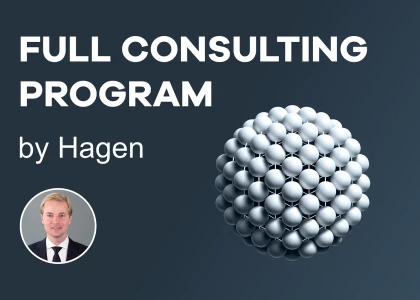Perhaps a silly question given the timing, but I’m worried about asking the “wrong” clarifying questions after the case prompt has been given and then not getting the right/enough information. It wasn’t a big problem in the first round, and the cases tend to be pretty detailed anyway, but I worry that having poor clarifying questions might come across as not understanding the important parts of the case.
Is this actually something to be concerned about or does it not matter?
McK final round - can you get dinged for not asking the “right” clarifying questions?


Hi there,
First of all, congratulations on the progress in the application process with McK thus far!
I would be happy to share my thoughts on your question:
- First of all, while not directly, it is indirectly crucial to ask the right clarifying questions as you may otherwise not be able to create a structure that fits and face other issues throughout the case study.
- Moreover, I would still advise you to just wait and see the outcome.
If you would like a more detailed discussion on your specific situation, please don't hesitate to contact me directly.
Best,
Hagen

Hi there,
More indirectly than directly.
Asking questions helps you get a better understanding of the case context and objective.
If you have a faulty understanding at this point, this could come with issues during the individual parts of the case, e.g., you might create a framework that misses part of the problem or is not relevant, you might not interpret a chart correctly as you missed some key insight from the prompt, etc.
To avoid this, I'd put the clarification questions into two buckets:
- Operationalize the goal (What's the exact objective, target, and timeline): This helps you figure out what the client actually wants to achieve/know/solve. You should ask this as it defines the solution space and therefore impacts your analytical framework. Many case prompts include a very vague and ill-defined goal (on purpose).
- Understand the situation better (contextual questions and questions related to the business model or workings of the industry). Do not fish for information on the problem at this stage of the case. Here, it is all about understanding the situation to then define an analysis plan with your framework.
Overall, this process should not last longer than 2-3 minutes (Q&A at the beginning of the case) and the questions should come naturally to you without thinking.
Cheers,
Florian

Hey!
It's totally normal to worry about asking the "wrong" clarifying questions during a case interview, but it’s actually better to ask questions than to stay silent and risk misunderstanding the case. Here’s why:
- Clarifying Questions Show Engagement: Asking questions shows that you're thinking about the case and trying to fully understand it. This is a good thing because it demonstrates that you're engaged and want to get the details right.
- You Need the Right Information: If you don’t ask questions, you might miss important details that could help you solve the case. Even if the cases are detailed, there could be specific aspects that you need to clarify to come up with the best solution.
- Better to Ask Early: It’s much better to ask clarifying questions at the beginning rather than realizing later that you didn’t fully understand something. This could save you from going down the wrong path and wasting time.
- They Understand It's a Pressure Situation: Interviewers know that case interviews are stressful and that candidates might feel nervous about asking questions. They’re not expecting perfection; they want to see how you think and approach problems.
So, it does matter, but in a good way! Don’t worry about asking the wrong questions—missing out on important information is much worse. Instead, focus on asking thoughtful, relevant questions that help you get the information you need to solve the case.
Hope this helps :)
BR, Alessa

Hi there,
Clarifying questions are not in itself an assessment criterion. They are an auxiliary element for you to develop an appropriate approach and structure to the case. So it really depends on how your case performance unfolded in the end, whether asking more clarifying questions would have helped you. For example, if you weren’t sure about the ultimate objective or scope of the case or you were unfamiliar with certain terminology or parameters provided in the prompt, then yes, you should have clarified that.
Otherwise, you’ll just have to wait for official feedback at this point. Fingers crossed

McKinsey is not evaluating your clarifying questions. In fact, I've used dozens of official McKinsey cases and none of them is hiding information from candidates. Information is provided by the interviewer when required.
The only questions you must ask are about business or industry terms you are not familiar with. You cannot solve what you don't understand.
Best,
Alberto













